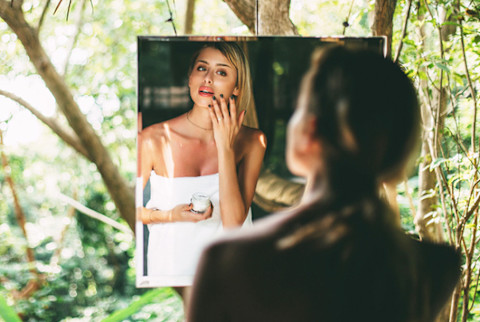
Antioxidant: it’s a major buzzword. But what does it mean to you? Generally, I’m sure you understand that antioxidants are good and that oxidation is not so good, so we want to prevent oxidation by eating and applying antioxidants. That’s the gist of it, to be sure. But don’t you want to know what it really means so that you understand what antioxidants are doing in your diet and in your skin care products?
We need oxygen. We can’t live without it. But it does damage, too. Inside cells, a phenomenon called oxidative stress causes trouble. Oxidation is a process by which exposure to oxygen produces free radicals. A free radical is a molecule with a dangling bond. When the water molecule gets oxidized, it loses one of its hydrogen atoms and just has a dangling free bond (this molecule is now called the hydroxyl radical), which grabs anything and everything it can, until all hell breaks loose inside the cell. It grabs on to proteins, like collagen, causing them to uncoil and become damaged, resulting in cell injury and cell death, ultimately translating to saggy, more wrinkled skin.
Now, before you hate all radicals, let me say that A FEW of them are necessary. Their presence inside a cell can indicate that the cell is damaged and ready to be disposed of by the larger cells responsible for cleaning up debris. Cells with unwanted bacteria often have radicals, which signal to the extracellular environment that they need help. But, when too many free radicals show up, it’s impossible to keep track of the helpful, signaling molecules versus the destructive, mutation-causing ones and the cleanup cells just get overwhelmed and confused.
So, finding the right balance is the trick. Despite the beneficial actions of antioxidants inside the body, high-dose antioxidant supplements have not been conclusively shown to prevent the diseases caused by oxidative damage and can even be harmful1. However, consuming antioxidant-rich foods2 and using skin products high in antioxidants like natural beauty maven Josh Rosebrook's potent Cacao Antioxidant Mask ($60) can help keep free radicals at optimum levels. Three antioxidants particularly relevant to skin care are vitamins A, C, and E.
Vitamin A
Commonly referred to as tretinoin or retinoic acid, is the active ingredient in Retin-A. While it is available in pharmaceutical format and has been shown to improve skin appearance, it has been scrutinized lately for possible toxicity, both personal and environmental. Retinol, a milder form, is not as harsh on the skin but may have a similar toxicity profile. It ends up being a personal choice—many women are willing to risk a little toxicity in exchange for younger looking skin. For those on the fence, using oils rich in vitamin A is a safer alternative and can improve skin appearance, albeit more slowly. Try Osmia Organics Nectar Vital Rose Drops ($98) which smells amazing thanks to organic rose otto, Australian sandalwood, and jasmine oils.
Vitamin C
Vitamin C also has activity against free radicals and can help lighten dark spots and improve skin texture. One Love Organics Vitamin C Moisturizing Facial Serum ($75) uses a stable form of vitamin C to keep the vitamin in its most active, beneficial state. Both vitamins A and C increase sensitivity to the sun and can have diminished efficacy when exposed to sunlight, so remember to exercise caution here and always slather up with your SPF!
Vitamin E
Finally, vitamin E, which is essentially a collection of 8 tocopherols and tocotrienols, has been shown to limit oxidative damage3. This is brilliant for application on the skin, as well as in the skin care product itself, where it helps prevent rancidity and oxidation. And what's more, it’s easy to find—you can buy vitamin E oil straight at natural health stores or cut open the vitamin E gel caps to use that oil directly. Try BlueBonnet Vitamin E 400 IU Mixed Softgels ($24.40).
